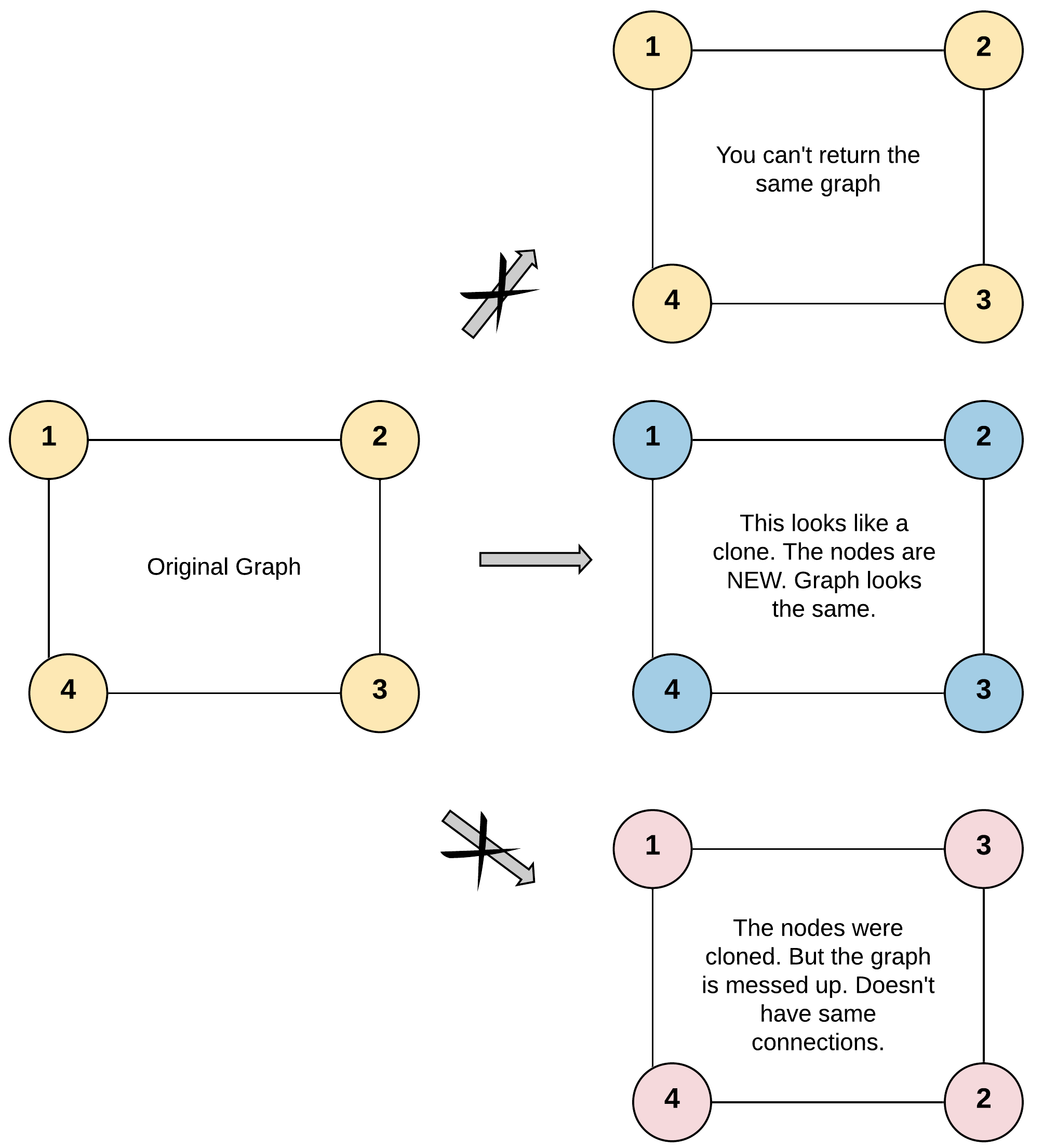Algorithm
Problem Name: 133. Clone Graph
Given a reference of a node in a connected undirected graph.
Return a deep copy (clone) of the graph.
Each node in the graph contains a value (int) and a list (List[Node]) of its neighbors.
class Node {
public int val;
public List<Node> neighbors;
}
Test case format:
For simplicity, each node's value is the same as the node's index (1-indexed). For example, the first node with val == 1, the second node with val == 2, and so on. The graph is represented in the test case using an adjacency list.
An adjacency list is a collection of unordered lists used to represent a finite graph. Each list describes the set of neighbors of a node in the graph.
The given node will always be the first node with val = 1. You must return the copy of the given node as a reference to the cloned graph.
Example 1:

Input: adjList = [[2,4],[1,3],[2,4],[1,3]] Output: [[2,4],[1,3],[2,4],[1,3]] Explanation: There are 4 nodes in the graph. 1st node (val = 1)'s neighbors are 2nd node (val = 2) and 4th node (val = 4). 2nd node (val = 2)'s neighbors are 1st node (val = 1) and 3rd node (val = 3). 3rd node (val = 3)'s neighbors are 2nd node (val = 2) and 4th node (val = 4). 4th node (val = 4)'s neighbors are 1st node (val = 1) and 3rd node (val = 3).
Example 2:

Input: adjList = [[]] Output: [[]] Explanation: Note that the input contains one empty list. The graph consists of only one node with val = 1 and it does not have any neighbors.
Example 3:
Input: adjList = [] Output: [] Explanation: This an empty graph, it does not have any nodes.
Constraints:
- The number of nodes in the graph is in the range
[0, 100]. 1 <= Node.val <= 100Node.valis unique for each node.- There are no repeated edges and no self-loops in the graph.
- The Graph is connected and all nodes can be visited starting from the given node.
Code Examples
#1 Code Example with C Programming
Code -
C Programming
start coding...
struct UndirectedGraphNode *copy1node(struct UndirectedGraphNode *graph,
struct UndirectedGraphNode ***srcpool,
struct UndirectedGraphNode ***dstpool,
int *sp, int *sz) {
struct UndirectedGraphNode *node;
int i = 0;
if (!graph) return NULL;
while (i < *sp && (*srcpool)[i] != graph) {
i ++;
}
if (i == *sp) {
node = malloc(sizeof(struct UndirectedGraphNode));
//assert(node);
node->label = graph->label;
if (*sp == *sz) {
*sz = *sz * 2;
*srcpool = realloc(*srcpool, *sz * sizeof(struct UndirectedGraphNode *));
*dstpool = realloc(*dstpool, *sz * sizeof(struct UndirectedGraphNode *));
//assert(*srcpool && *dstpool && *stspool);
}
(*srcpool)[*sp] = graph;
(*dstpool)[*sp] = node;
(*sp) += 1;
i = 0;
while (i < graph->neighborsCount) {
node->neighbors[i] = copy1node(graph->neighbors[i], srcpool, dstpool, sp, sz);
i ++;
}
node->neighborsCount = graph->neighborsCount;
} else {
node = (*dstpool)[i];
}
return node;
}
struct UndirectedGraphNode *cloneGraph(struct UndirectedGraphNode *graph) {
struct UndirectedGraphNode **srcpool, **dstpool, *node;
int sp = 0, sz = 100;
srcpool = malloc(sz * sizeof(struct UndirectedGraphNode *));
dstpool = malloc(sz * sizeof(struct UndirectedGraphNode *));
//assert(srcpool && dstpool && stspool);
node = copy1node(graph, &srcpool, &dstpool, &sp, &sz);
free(srcpool); free(dstpool);
return node;
}
Input
Output
#2 Code Example with C++ Programming
Code -
C++ Programming
class Solution {
private:
unordered_mapm;
public:
UndirectedGraphNode *cloneGraph(UndirectedGraphNode *node) {
if(!node) return NULL;
if(m.count(node) == 0){
m[node] = new UndirectedGraphNode(node->label);
for(auto x: node->neighbors) m[node]->neighbors.push_back(cloneGraph(x));
}
return m[node];
}
};
// BFS
class Solution {
public:
UndirectedGraphNode *cloneGraph(UndirectedGraphNode *node) {
if(!node) return NULL;
unordered_map < UndirectedGraphNode*, UndirectedGraphNode*>m;
UndirectedGraphNode* root = new UndirectedGraphNode(node->label);
m[node] = root;
deque < UndirectedGraphNode*>cur;
dequenext;
cur.push_back(node);
while(!cur.empty()){
UndirectedGraphNode* p = cur.front();
cur.pop_front();
for(auto x: p->neighbors){
if(m.count(x) == 0){
UndirectedGraphNode* copy = new UndirectedGraphNode(x->label);
m[x] = copy;
next.push_back(x);
}
m[p]->neighbors.push_back(m[x]);
}
if(cur.empty()) swap(cur, next);
}
return root;
}
};
Input
Output
#3 Code Example with Java Programming
Code -
Java Programming
class Solution {
public Node cloneGraph(Node node) {
if (node == null) {
return null;
}
Map < Node, Node> map = new HashMap<>();
Queue queue = new LinkedList<>();
queue.add(node);
map.put(node, new Node(node.val));
while (!queue.isEmpty()) {
Node removed = queue.remove();
for (Node neighbor : removed.neighbors) {
if (!map.containsKey(neighbor)) {
map.put(neighbor, new Node(neighbor.val));
queue.add(neighbor);
}
map.get(removed).neighbors.add(map.get(neighbor));
}
}
return map.get(node);
}
}
Input
Output
#4 Code Example with Javascript Programming
Code -
Javascript Programming
const cloneGraph = function(node) {
if (!node) return node
const map = {}
return traverse(node)
function traverse(node) {
if(!node) return node;
if (!map[node.val]) {
const newNode = new Node(node.val)
map[node.val] = newNode
newNode.neighbors = node.neighbors.map(traverse)
}
return map[node.val]
}
}
Input
Output
#5 Code Example with Python Programming
Code -
Python Programming
class Solution:
def cloneGraph(self, node: "Node") -> "Node":
visited = {}
def dfs(node):
if node and node.val not in visited:
newNode = Node(node.val, [])
visited[newNode.val] = newNode
newNode.neighbors = [
visited.get(n.val) or dfs(n) for n in node.neighbors
]
return newNode
return dfs(node)
Input
Output
#6 Code Example with C# Programming
Code -
C# Programming
using System.Collections.Generic;
namespace LeetCode
{
public class _0133_CloneGraph
{
public Node CloneGraph(Node node)
{
var map = new Dictionary < int, Node>();
return CloneGraph(node, map);
}
public Node CloneGraph(Node node, IDictionary < int, Node> map)
{
if (node == null) return null;
if (map.ContainsKey(node.val)) return map[node.val];
var newNode = new Node(node.val, new List < Node>());
map.Add(node.val, newNode);
foreach (var child in node.neighbors)
newNode.neighbors.Add(CloneGraph(child, map));
return newNode;
}
public class Node
{
public int val;
public IList < Node> neighbors;
public Node() { }
public Node(int _val, IList _neighbors)
{
val = _val;
neighbors = _neighbors;
}
}
}
}
Input
Output
